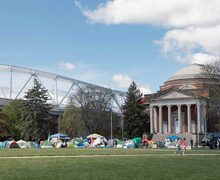Engineering school to offer more master’s online with more flexibility
People interested in pursuing a graduate program in the L.C. Smith College of Engineering and Computer Science at Syracuse University are no longer limited by their geographic location.
L.C. Smith is implementing a plan to offer four of its master’s programs online and on campus. In fall 2014, the computer science master’s program will be offered online, followed by the engineering management master’s program in the spring, said Michael Frasciello, director of online learning for the college.
“Syracuse University has a pretty good reputation and a long standing success with online graduate education,” Frasciello said, referring to the online graduate programs offered in both the School of Information Studies and the Martin J. Whitman School of Management.
The engineering master’s programs hope to follow that trajectory, Frasciello said.
The electrical engineering and computer engineering master’s programs offered online just went live this past January and both have less than 10 students enrolled in each program, he said.
“We expect we will fill the enrollment to the size of the residential programs, which may be around 20 per course,” Frasciello said.
The online programs will include the same curriculum and materials offered in the residential programs on campus, he said. The online course model will webcast lectures on campus live from the actual class, allowing online students to actively participate in the lecture from all over the world.
“As an online student you are attending class at the same time as the residential students are,” Frasciello said. “The platforms we use show everything that is being written or presented. Students watching the webcast can also hear questions from other students and pose questions to the professor.”
However, there is still debate surrounding the difference between learning online versus in the classroom.
Wenliang Du, a professor in the department of electrical engineering and computer science, said he does not believe students will receive the same level of education through the online programs as they would in classrooms on campus.
Du attributes this to the lack of interaction between online students and their peers and faculty, he said.
“They also don’t have the same learning atmosphere that they get from sitting in a classroom and discussing in person,” he said.
While the level of education may not be identical, Du said online platforms like this can narrow the gap between the quality of education online versus on campus.
Additionally, this online option will now offer master’s programs to a wider range of students.
There are a lot of people who could benefit from having the master’s programs offered online, said Chilukuri Mohan, a professor in the department of electrical engineering and computer science.
People who have full-time positions at other corporations may not be able to physically come to campus, Mohan said.
“It is now possible for them to do one to two courses, and eventually earn a degree,” he said. “They have families, and other commitments — so it would be very hard for them to come full time.”
L.C. Smith is committed to improving the quality and experience of the online master’s programs, Frasciello said. The transition to more online opportunities makes it so that commitment pays off.
Said Frasicello: “We are trying to bring the residential and online experiences together, in a unified way.”
Published on February 26, 2014 at 1:11 am
Contact Jen: [email protected]




